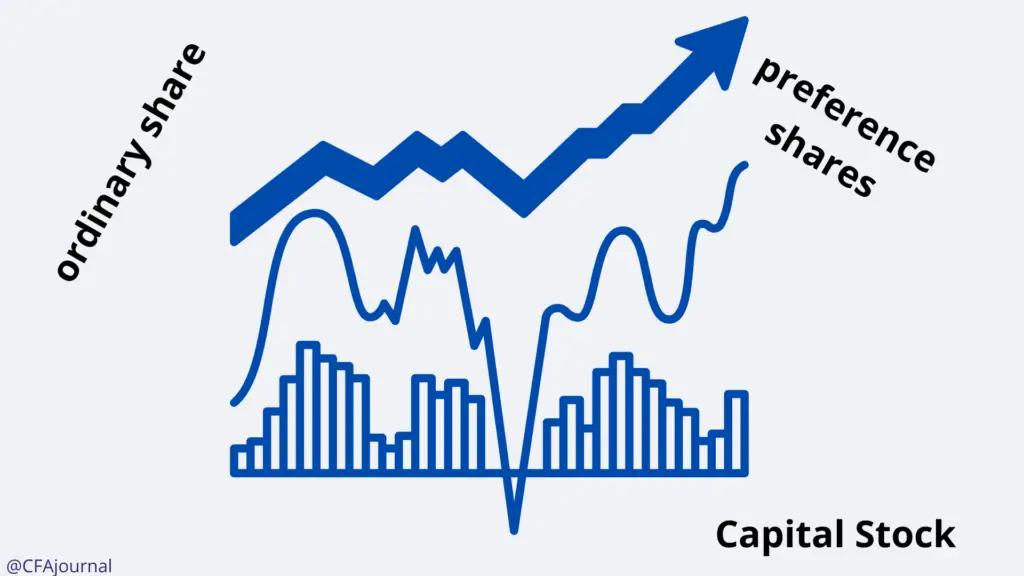Definition:
Capital stock denotes the shares of possession that an organization has given. It is the total of standard and preferable shares that an organization has the approval to issue. This is as per its corporate agreement.
How Does Capital Stock Work?

A corporate contract is an authoritative record that presents a partnership’s essential data, for example, its area, benefit/charitable status, board composition, and possession structure.
Corporate charters ordinarily incorporate the number of shares the organization is approved to issue (both standard and preferred stock).
The organizers and board members regularly choose the capital stock measure, with contributions from their lawyers and industry standards.
The capital stock sum becomes a publicly available report when the organization records the corporate charter with the secretary of state for the state wherein the company is settled.
Breaking It Down
Just the organization is capable of issuing capital stock and the greatest number of shares can be exceptional. It is a path for an organization to raise capital as a way to develop its business.
Investors who look for value appreciation and profits can buy the stock. On the other hand, one can trade stocks for resources, like equipment for appropriately working their business.
For What Reason Does Capital Stock Matter?
The capital stock is not equivalent to the number of currently outstanding shares; capital stock is the greatest number of shares that can be outstanding.
Outstanding shares exist on an organization’s accounting report under the heading of capital stock.
When organizations need to change this number, they should alter their charters. The point when organizations do this might be a sign that organizations mean to raise capital.
Advantages and Disadvantages
There is an equivalent measure of advantages and disadvantages of selling capital stock. Most likely the greatest favorable position is that organizations do not have to take out debt to support new projects.
When an organization needs additional cash to develop, it can sell capital stock as opposed to applying for a loan.
Along these lines, they will not need to take care of with interest. An extra favorable position is that it permits them to get more cash flow than if they had applied for a loan.
Disadvantages include that by offering capital stock to financial specialists, an organization will surrender a part of its equity.
The more capital stock distribution, the more the value of each share weakens. With the potential advantages comes the likelihood of the dispersion reverse discharges on the organization later on down the line.
Capital Stock Calculation
The capital stock count can be divided into deciding basic stock balance and preferred stock balance.
- Common stock balance can be determined by multiplying the par value of the normal stock with the number of regular shares outstanding.
- Preferred stock equalization can be determined by multiplying the par value of the preferred stock with the number of preferred shares outstanding.
To discover the standard estimation of typical stock, data is promptly accessible in the stock certificates. It is a fixed sum in dollars assigned to every common share.
Equation
To discover the estimation of capital stock, you have to utilize the condition below:
Capital Stock = Number of shares issued x Par Value per share
Something that is imperative to note is that par value is a set dollar sum. In particular, one that is assigned to every basic share.
Any sum that is over the standard that the investors pay goes into the bookkeeping books under extra paid-in capital.
The aggregate sum of capital stock should never be more than the measure of approved stock.
Conclusion
Overall, capital stock is a prominent strategy for business development and cash raising. By buying stock from a partnership, a financial specialist might receive ample rewards (for example profits).
Obviously, there are risks associated with it; however, the prizes one could acquire are too enticing even to consider ignoring.
The capital stock of an organization shows the adequacy of its budgetary well-being. The more it is, the better since that would mean less dependence on outside debt.
In any case, this ought not to imply that an enterprise with more debt on its accounting report would not be a safe bet to invest in.
Diverse budgetary specialists have various assessments for the correct blend of equity and debt, and what an enterprise should aim for.
